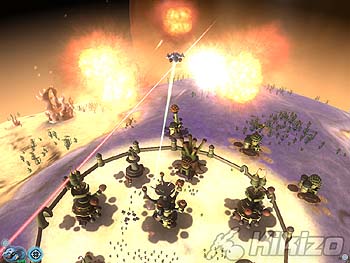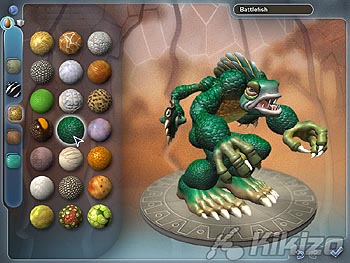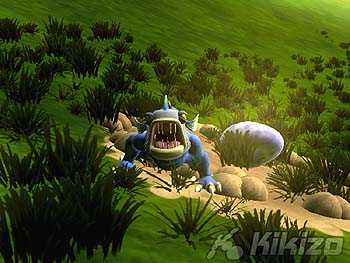Spore: In-Depth Preview with Will Wright
We take a detailed look at Spore in a guided tour with Will Wright, to discover why this is a game so mesmerising, everyone seems addicted before it's even out.
Page: 1 2
Page 2
When the eggs are ready to hatch, players will go back to the editor and be able to take the points they earned in the previous generation and reinvest them. "This is like evolution," explains Wright. "I can buy some better feet because I want him to go a little faster, and an extra set of arms so that he'll have eight arms, or changes that are more aesthetic, so I can change goofy eyes for something a bit more serious, which can make him look very different with just a subtle change."
"Some people like to spend a lot of time in these editors, but we found that it's about ten per cent of our players that like spending hours in the editor making cool things, while the other ninety per cent were able to download from fansites, and now we're trying to connect these dots - so the people that spend a lot of time making cool stuff automatically connect to the servers, and the best stuff gets sorted and can be redistributed to everyone else. We're trying to take the benefit of that creativity."
Coming back to the game from the evolved version of the creature, you're born as the baby into the game, you can interact and play together with siblings, and as they interact, they become more social. They will start bonding and mimicking you, which is useful for being able to take on larger creatures as a pack. Eventually players will get to the travel phase where they're controlling many of the creatures in 'tribes', once they become intelligent, and start to build their village.
"We have new editors like the village editor and hut editor, and at some point I can actually design all the trees on my planet," explains Will. "This part is sort of like Sim City, where we're building the city and kind of defining cultural parameters. We let you unlock a building editor, where we design individual buildings. And the thing is, once you've learned one editor, they all pretty much work the same way, so you learn one and you've learned them all... this is how you progress, either culturally, militarily or economically."
Later in the game, way forward in evolution, players will find themselves at the stage where they have a global civilisation. "We have individual species, vehicles and buildings that have all been designed in the editor, either by the player or by someone else; it automatically populates throughout the world. There are cities that are sort of traditional organic cities, and some that are more modern, industrial cities. At this point of the game, I've actually evolved across an entire planet, and I'm ready to go to the next level, which is the space game."
"The game has been watching what I buy and build through the course of the gameplay, and building a model of my aesthetic, where it can give recommendations, and it will look at what other players have made that it thinks I will like", he says as he jumps into his species' wacky new space ship. "The UFO is a very powerful tool in this game; it's very mobile and has a huge number of upgrades that I can use later. So now I'll want to start another ecosystem on another planet, so I might want to bring samples from my own planet. And I have an abduction ray on my UFO that I can use to pick things up."
In the spaceship, or charmingly in the universe of Spore, the UFO, we start to get our first view of the planet we've evolved on in a broader sense. "For the first time you will really go up high and get an overview... you can see things like weather systems, lighting... we can also see the solar system, with our own stars and planets and some other planets." A nearby planet in Will's game already has primitive life on it, and if players want they can just go on down and explore, and even drop some of their own creatures there to see how well they survive on the planet. Some planets are very realistic, while others are a bit more fanciful and creative. "Eventually you'll be able to create entire planets," adds Will.
 Later in the game, way forward in evolution, players will find themselves at the stage where they have a global civilisation
Later in the game, way forward in evolution, players will find themselves at the stage where they have a global civilisationInterestingly, as you explore and play in this limitless universe, your personal 'Sporepedia' tracks all the creatures you've met and places you've visited. "We have a database of all the content that you encounter in the game, and the metaphor for it is trading cards - every piece of content has a trading card for it. There can be trading card games based around it, you can actually print cards out, and there'll even be editors to design custom cards and custom decks. So I can have my friend's content automatically populate my universe, or have my content in other people's universes - I can see how popular my creatures are. And I can use this for research; I can hook up with other creatures that I've encountered in the game for missions in space."
Up in Spore space, there are thousands of stars, things like black holes, and all the things you might see in Hubble space images. Sooner or later you'll want to colonise other planets, but planet selection is key; some planets may be too close to a star and too hot to live on. The planet you take a shine to might be created by another player, with that player's intelligent life on it, although it might be the computer that's controlling a 'copy' of someone else's world, like an NPC. And however that player controlled their world, whether it was aggressively, peacefully or whatever, is observed by the game and programs the planet's personality.
As we've all learnt from War of the Worlds, a combat scenario from foreign beings isn't always the politest of occasions, but players have options about how they go about colonisation. Indeed, some primitive civilisations on planets you fancy might not even know what to make of your arrival and might start to worship you, only for you to go all Wellsian on their ass and start blowing their houses up.
"There are thousands of words, and each one is unique - some are player created and some computer generated, but they're all unique," says Will excitedly. "But even this is a very small section of the entire galaxy; we're in fact dealing with millions of unique worlds, and the way we can do that is we can have millions of players automatically building these worlds as they play, transparently."
It will be interesting to see how lasting Spore's appeal is and how the community will survive, or avoid, attacks against each other. Indeed, how the game itself might evolve as players add more and more of their own content. But it is diffcult to ask questions about the game's potential with so much already coded in. Starting at microscopic level with the 'tidepool' phase, and through creature, tribal, city and civilisation phases, the subsequent extension to mission-based space is gaming on an unprecedented scale, and the cataloguing of every player's experience with the Sporepedia adds a seemingly never-ending amount to be enjoyed.
And let's face it, with around sixty million copies of The Sims sold to date, this is one universe that's likely to grow pretty quickly. If only sorting our own planet out were this easy, maybe there'd be a few more games like Spore to get excited about...
Spore is scheduled for release in 2007.
Adam Doree
Director, Kikizo
Page: 1 2
| Video Coverage (Latest Videos & Video FAQ) | |||
| PLEASE DO NOT DIRECT LINK TO ANY MEDIA FILE ON KIKIZO | |||
| Description | Dur. | Size | Details |
| New Videos (8/10) | |||
|
Spore It's the extended E3 trailer |
01:24 | 13MB | DF, SD, 16:9 640x360p30 1.5Mbps |
| Recent Videos | |||
|
Spore HSN Direct feed gameplay 1 (PC - EA) |
03:36 | 51MB | DF, SD, 16:9 640x360p30 2.5Mbps |
|
Spore Direct feed gameplay 2 (PC - EA) |
03:06 | 48MB | DF, SD, 16:9 640x360p30 2.5Mbps |
|
Spore HSN Direct feed gameplay 1 (PC - EA) |
03:36 | 51MB | DF, SD, 16:9 640x360p30 2.5Mbps |
|
Spore E3 Direct feed gameplay 2 (PC - EA) |
03:06 | 48MB | DF, SD, 16:9 640x360p30 2.5Mbps |













 Satoru Iwata Video Interview - the late Nintendo president spoke with Kikizo in 2004 as 'Nintendo Revolution' loomed.
Satoru Iwata Video Interview - the late Nintendo president spoke with Kikizo in 2004 as 'Nintendo Revolution' loomed. Kaz Hirai Video Interview - the first of Kikizo's interviews with the man who went on to become global head of Sony.
Kaz Hirai Video Interview - the first of Kikizo's interviews with the man who went on to become global head of Sony. Ed Fries Video Interview - one of Xbox's founders discusses an epic journey from Excel to Xbox.
Ed Fries Video Interview - one of Xbox's founders discusses an epic journey from Excel to Xbox. Yu Suzuki, the Kikizo Interview - we spend time with one of gaming's most revered creators.
Yu Suzuki, the Kikizo Interview - we spend time with one of gaming's most revered creators. Tetris - The Making of an Icon: Alexey Pajitnov and Henk Rogers reveal the fascinating story behind Tetris
Tetris - The Making of an Icon: Alexey Pajitnov and Henk Rogers reveal the fascinating story behind Tetris Rare founders, Chris and Tim Stamper - their only interview? Genuinely 'rare' sit down with founders of the legendary studio.
Rare founders, Chris and Tim Stamper - their only interview? Genuinely 'rare' sit down with founders of the legendary studio. The History of First-Person Shooters - a retrospective, from Maze War to Modern Warfare
The History of First-Person Shooters - a retrospective, from Maze War to Modern Warfare